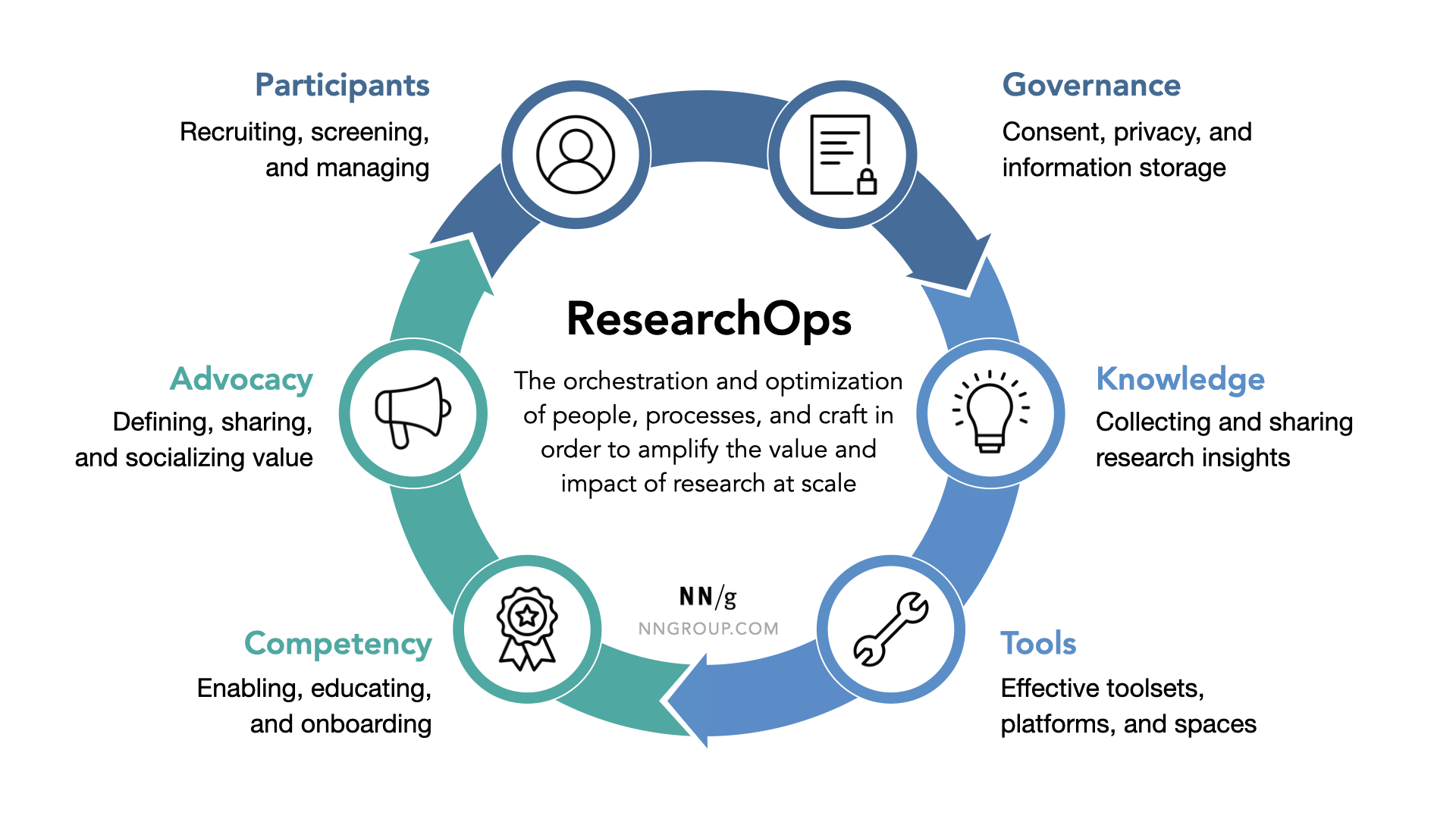

Summary: The practice of Research Operations (ResearchOps) focuses on processes and measures that support researchers in planning, conducting, and applying quality research at scale.
ResearchOps is a specialized area of DesignOps focused specifically on components concerning user-research practices.
ResearchOps (ReOps): The orchestration and optimization of people, processes, and craft in order to amplify the value and impact of research at scale.
ResearchOps a collective term for efforts aimed at supporting researchers in planning, conducting, and applying quality user research, such as:
The exponential growth of the UX profession means that more companies are realizing the value of UX and that the demand for UX and user research is increasing. This is great news: the value of our work is known and deemed necessary much more so than it was in the recent past.
The practical task of scaling research practices to meet this increased demand, however, often falls to existing UX research staff, with little guidance or additional bandwidth. Senior user researchers or research managers must deal with the responsibility and challenge of developing processes to scale their practices to match demand — all while simultaneously continuing to plan and facilitate research sessions.
If a company does 10× the amount of user research it used to, the cost shouldn’t be 11× the old budget, as is all too likely if more projects lead to more bureaucracy, coordination, and other overhead costs. The new cost should be 9× due to economies of scale and reuse of prep work across studies. In fact, the ResearchOps cost goal should really be 8× or lower.
ResearchOps can provide relief, with dedicated roles (or at least focused efforts, if dedicated roles are not feasible) to create and compile intentional strategies and tools for managing the operational aspects of research, so that researchers can focus on conducting studies and applying research insights.
Many people equate ResearchOps with participant management (e.g., screening and scheduling participants for research studies), because this aspect is often an immediately obvious pain point for researchers and takes much time. While participant management is certainly an important component of ResearchOps, it is not the only aspect. The full landscape of operational elements necessary for creating and scaling a research practice is much broader.
As a former contract ResearchOps Specialist at Uber aptly explained to me during a series of interviews that I conducted with DesignOps and ResearchOps professionals: “The value ResearchOps can bring is not just calling and getting a participant but building a program and establishing consistent quality for communications and research methods.”
ResearchOps addresses a tapestry of interwoven operational aspects concerning user research, where every component both affects and is affected by the other elements.
The ResearchOps model described below was created by identifying key focus areas from our DesignOps and ResearchOps practitioner interviews. It outlines 6 common focus areas of ResearchOps:
As the cyclical design of the model conveys, these are not isolated elements, but interrelated factors that drive the need for and influence each other.
 with 6 areas: participants, governance, knowledge, tools, competency and advocacy" width="1920" height="1080" />
with 6 areas: participants, governance, knowledge, tools, competency and advocacy" width="1920" height="1080" />
The first component of ResearchOps — but not the only one — is participant management. This area includes creating processes for finding, recruiting, screening, scheduling, and compensating research-study participants. It’s often low-hanging fruit, because it’s typically the most apparent and immediate need of overloaded research teams.
Common ResearchOps activities and efforts within participant management include:
Governance guidelines are a necessity for any study involving participants. For example, consent templates must be compliant with existing data-privacy regulations, such as GDPR, and written in plain, transparent language. Additionally, as participants’ personally identifiable information (PII) is collected, the organization must follow legal regulations and ethical standards concerning where that information is stored, how long it is stored, how it is protected, and how its storage is made transparent to the participant. (PII refers to any data that could be used to identify a person, such as a full name, date of birth, or email address.)
Common ResearchOps activities and efforts within governance include:
As data begins to accumulate from studies, the need for knowledge management becomes increasingly apparent. This element of ResearchOps is focused on collecting and synthesizing data across research studies and ensuring that it is findable and accessible to others. Not only can effectively compiled and managed research insights help research teams share findings and avoid repetitious studies, but they can also serve to educate those outside the team.
Common ResearchOps activities and efforts within knowledge management include:
Most of the activities discussed so far require tools or platforms. For example: What platform will be used to recruit and screen participants? What applications will be used to manage participant PII? What programs will be used to house all of the resulting research findings? Furthermore, tools that facilitate the actual research, such as remote usability-testing platforms, analytics, or survey platforms, or video-editing and audio- transcription tools, must be considered. While autonomy in choice can be valuable, auditing the research toolset to create some level of consistency across the team expedites sharing and collaboration.
Common ResearchOps activities and efforts within tools include:
As the demand for and amount of research conducted continues to scale, it becomes critical to also grow the organization’s research capabilities and skills. The competency component is concerned with enabling more people to understand and do research. This effort often involves providing resources and education both to (1) researchers, so that they can continue to develop their skills, and (2) nonresearchers, so that they can integrate basic research activities into their work when researchers are unavailable (and know when to call for help instead of rolling their own study).
Common ResearchOps activities and efforts within competency include:
The final component, advocacy, is concerned with how the value of UX research is defined and communicated to the rest of the organization. Simply put, what is being done to ensure that the rest of the organization is aware of the value and impact of research? For example, does the team socialize success stories and demonstrate the impact of user research? To come full circle on the cyclical nature of the model, proper advocacy helps ensure fuel and resources for all the other focus areas and ensures the ResearchOps practice can continue to scale effectively.
Common ResearchOps activities and efforts within advocacy include:
The 6 components in this model are specialized areas that research practices must consider in order to create consistent, quality research efforts across teams; however, there are other elements that must be considered and intentionally designed that are critical to the health of any research team or practice.
One such area is documented career pathways. The documentation and use of career pathways in general is rare. (In our recent DesignOps research, only 11% of respondents reported having a documented, shared growth path — an abysmal percentage.) But, especially within relatively nascent domains, such as ResearchOps, where there is no decisive, publicly available legacy of successful team structures or models for roles and responsibilities, it’s equally both critical and challenging to create and document such pathways.
To make sure that you include additional elements that are not represented in this ResearchOps model, reference our DesignOps framework. It provides a comprehensive landscape of potential focus areas for operationalizing design in general; many of these areas equally apply to creating a healthy, focused ResearchOps practice. Team structure and role definitions, consistent hiring and onboarding practices, team communication and collaboration methods, and workflow balance and planning are just a few additional areas to consider.
As mentioned, ResearchOps is a whole of many parts that are best considered holistically, because every component both affects and is affected by the other factors. However, when establishing a ResearchOps practice, not all aspects can be addressed at once.
The first step to figuring out where to start is understanding where the biggest pain points are. Are researchers overwhelmed with the logistics of recruiting and scheduling participants? Maybe participant management is the best starting point for the team. Is research data scattered and inaccessible to new team members, causing duplicative research efforts and poor research memory? Perhaps knowledge management is where the team should focus.
Begin by identifying the current problems that necessitate ResearchOps. Perform internal research to understand where the biggest pain points currently exist for research teams and research-team partners. For example, you could send out a survey or have focus groups with researchers to collect information on whether current processes enable them to be effective and what gets in their way the most. Additionally, carry out internal stakeholder interviews to uncover the biggest pain points for partners within the research process. This knowledge will help you create a clear role for ResearchOps.
Just remember, when it comes to scaling research, balance your focus between the component that you chose to address and the overall tapestry of considerations. Evolve and expand your focus as needs shift to maintain a balanced practice.
The ResearchOps Community is a group of ResearchOps professionals and researchers who have conducted extensive research to understand the way the UX community thinks about and addresses ResearchOps challenges. They have compiled a collection of resources and thought leadership on the topic, available on the group’s website.